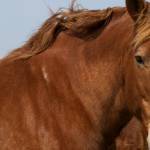Managing Insulin Dysregulation and Obesity in Horses: Beyond Diet

Researchers recently identified a specific type of protein called glucose-dependent insulinotropic polypeptide (GIP) as a potential therapeutic target for horses with insulin dysregulation. By blocking the action of GIP, equine scientists hope that insulin levels can be better controlled which, in turn, will help control obesity and limit laminitis.
“Insulin dysregulation refers to various abnormalities in insulin metabolism, including abnormally high circulating levels of insulin and insulin resistance. Due to the continued increase in the number of horses affected by insulin dysregulation and the lack of a cure, GIP offers a glimmer of hope for affected horses,” explained Catherine Whitehouse, M.S., an equine nutrition advisor for Kentucky Equine Research (KER).
According to the study*, the GIP protein falls into a category of hormones called incretins. These hormones are produced in the gastrointestinal tract and enhance insulin release following a meal.
“In addition to stabilizing blood glucose concentration, GIP promotes the production and survival of the pancreatic β-cells that produce insulin and modulates obesity,” added Whitehouse.
The study also found:
- Horses express incretins in various tissues, such as the pancreas, heart, liver, kidney, and duodenum but was not found in gluteal muscle;
- Insulin production by pancreas cells in cultures was stimulated by glucose in a concentration-dependent manner;
- Insulin production by pancreas cells was decreased after a GIP-blocking protein was added to the cell cultures; and
- In live horses, GIP concentrations circulating in the bloodstream were higher in horses with increased body condition (BCS) and cresty neck scores.
“These data show that blocking GIP could ultimately prove to be a valuable treatment option for horses suffering obesity, insulin dysregulation, and metabolic syndrome. Until such products are commercially available, owners are encouraged to maintain their horses at an appropriate BCS to help prevent insulin dysregulation,” Whitehouse explained.
If your horse already suffers insulin dysregulation and laminitis is a concern, consider supplementing with KER’s Bio-Bloom PS (Bio-Bloom HF in Australia), a nutritional supplement containing key nutrients for hoof health.
“Bio•Bloom PS contains biotin, methionine, iodine, and chelated zinc to improve hoof growth and strength,” reported Whitehouse.
*Kheder, M.H., M.N. Sillence, L.M. Bryant, et al. 2017. The equine glucose-dependent insulinotropic polypeptide receptor: A potential therapeutic target for insulin dysregulation. Journal of Animal Science. 95(6):2509-2516.








